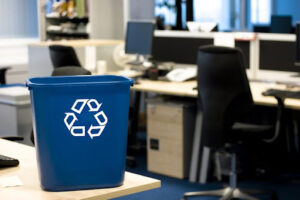Here are two things we know for sure about Americans and recycling: First, most people believe that recycling is a good and important practice. In a 2017 Carton Council survey of nearly 7,000 people, 94 percent said they support recycling and 74 percent said it should be a priority. Many people also say they care about working for companies that support sustainability efforts, which means maintaining a recycling-friendly workplace can be a useful tool for attracting and retaining employees.
We also know that good intentions around recycling don’t always translate to action, since the EPA reports the U.S. has a recycling rate of just 32 percent.
A few key obstacles keep people from recycling consistently, including at work. Luckily, many of those recycling challenges have pretty simple solutions.
Obstacle: Employees aren’t interested in recycling.
 There are plenty of things an employer can do to create a recycling-friendly workplace, but those efforts are pointless without the cooperation of the people who actually work there. The fact is that not everyone thinks about or sees the value in recycling. Some of your employees probably don’t recycle at home and aren’t in the habit of doing it at work either. Asking them to make more of an effort to recycle probably isn’t going to be hugely useful for increasing your overall recycling rate.
There are plenty of things an employer can do to create a recycling-friendly workplace, but those efforts are pointless without the cooperation of the people who actually work there. The fact is that not everyone thinks about or sees the value in recycling. Some of your employees probably don’t recycle at home and aren’t in the habit of doing it at work either. Asking them to make more of an effort to recycle probably isn’t going to be hugely useful for increasing your overall recycling rate.
Offering an incentive might be a more effective way to get employees to recycle more. Maybe this means setting a certain recycling goal for the month and buying employees lunch or giving them an extra hour of PTO for every month in which the goal is met.
Obstacle: Employees are too enthusiastic with what they recycle.
While some of your employees might be too lax about recycling, you probably also have employees who recycle too much. These are the people who are guilty of wish-cycling, or putting materials in recycling containers because you hope they can be recycled. Greasy pizza boxes are the classic example of wish-cycling; people hope that the cardboard is still reusable even though it’s covered with food residue. This practice contaminates loads of materials that can actually be recycled, and sets the wrong example within your workplace. (Once someone puts greasy boxes in the cardboard recycling bin, the next person who cleans up after a group lunch might do the same thing.)
People who are guilty of wish-cycling generally don’t realize they’re doing anything wrong. Education is the best solution here. Appoint a staff member to research your municipality/recycling vendor’s rules about what materials can and can’t be accepted for recycling. Have them take photos of things that commonly get wish-cycled in your workplace, and create brightly-colored signs with those images and a few tips about how to determine whether something belongs in recycling or trash. Hang these signs at eye level wherever your containers are set up.
Obstacle: Recycling containers aren’t conveniently located or accessible.
Off the top of your head, can you picture where your business’s recycling containers are set up? Do you have recycling containers near every trash bin? How far do employees in different parts of the building have to go to reach the closest recycling bins? Do those bins ever get so full that people end up tossing their recyclable waste in a trash bin instead?
An essential part of creating a recycling-friendly workplace is making it so easy to recycle that employees have no reason not to do their part. That might mean bringing in more or larger recycling containers and/or relocating recycling containers to more central areas of the workplace. If you notice that these containers are overflowing, whoever empties your bins should do this more frequently so employees and visitors can always dispose of recyclables in the correct place. Some businesses that generate a lot of recyclable waste might also benefit from bringing in new kinds of recycling equipment such as balers
Obstacle: The business buys too many non-recyclable supplies.
Employees can only recycle things that are recyclable. If your business stocks its break rooms with plastic-coated paper coffee cups, non-recyclable coffee pods and other single-use products, workers might see your other efforts around recycling as hypocritical.
Your purchasing decisions can be a big part of creating a recycling-friendly workplace. When your budget allows, buy products that are made from recycled materials and/or made of materials that can be recycled when you’re done with them. Start small by replacing just one item, like switching your disposable coffee pods for recyclable or reusable pods. Announce the change in a company-wide email to spread the message that your business is being proactive about recycling and sustainability. You might even solicit employee suggestions about other purchasing changes they’d like to see the business make.
Miller Recycling understands the obstacles that keep people from recycling consistently. We work with businesses of all kinds to create processes that make recycling easy, minimizing effort for business leaders and maximizing how much businesses can earn for their valuable recyclables. If we can help you create a more recycling-friendly workplace, contact us today!

